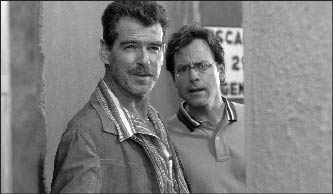Posting Bond: The Matador
by M. Faust

He calls himself Julian Noble, a name preposterous enough for us to assume that he invented it. Which is reasonable, given that he has one of those jobs where one would be loathe to use one’s real name: He kills people. Professionally, generally on corporate assignment. He laughs off the term “hit man,” but would never be so pretentious to call himself (as his employer does) a “facilitator of fatalities.”
Mostly he just looks at himself as a corporate fix-it man, working a job that allows him to travel the world, live in hotels, and wallow in liquor and hookers. But twenty years of this are taking their toll: stress is catching up with him in the form of increased drinking, bad dreams and disruptive hallucinations in which he sees himself when he looks in the viewfinder of his rifle.
Just the kind of thing to spoil one’s aim.
As played by Pierce Brosnan, Julian is a cipher at the heart of The Matador. That might not have been the case had the role been played by some other actor, one not so unshakably identified with a character who is an icon of glacial confidence.
Brosnan also produced The Matador, clearly because he wants to shake the specter of James Bond (and needs to if he is to have a non-007 film career). The role certainly gives him a chance to do plenty of capital-A Acting. A chance encounter with a businessman (Greg Kinnear) at a hotel bar in Mexico City leads Julian to do something he’s never done before: talk about his work. Danny, a salesman with a tragic past and a foundering career, at first doesn’t believe him, but changes his mind when Julian shows him how he would kill a stranger selected at random.
The chance to open up seems to help, and they part ways, presumably never to see each other again. So imagine Danny’s surprise when he and his wife (Hope Davis) answer a knock at their door late one winter night and find Julian there.
Written and directed by Richard Shepard, The Matador is one of those movies with an ending that forces you to reassess everything that came before it. I wouldn’t ordinarily give away something like that, and do so only in order to tell you something else that will aid your enjoyment of the film. Because Shepard has constructed his plot clumsily, you go though the movie aware that something about it is being withheld, and the logical thing is to assume that Julian has some hidden motive for his behavior. He doesn’t: you can take him at face value.
As writers sometimes will when dealing with a narrative that yanks the rug out from under you, Shepard gives his ending far too much weight. It’s irritating to watch a film that doesn’t make any sense until you get to the ending; such slight of hand is only a valid tool when it casts a new light on a story that you thought you had understood. In other words, the story has to be plausible up to the point at which we gain a new, contrary understanding of it. That’s not the case here.
How much you enjoy The Matador will depend on your liking for Brosnan, who doesn’t so much dispel the ghost of Bond as create a sort of bizarre version of him. (He doesn’t have the luxury of Sean Connery, who was able to grow a beard, throw away his toupee and become a whole new kind of leading man.) It’s fun to watch him staggering about drunk and facing various improbable visions, like a shark in a swimming pool, but this is really only taking advantage of his natural charisma. The scenes that require more acting are so poorly written, like the endless scene when Julian shows up at Danny’s door, that no actor could have done anything with them. He’s being talked up for an Oscar nomination for Best Actor, but I don’t think the voters will have trouble finding five better performances from 2005.
|
Issue Navigation> Issue Index > v5n4: Police Story: Inside the Buffalo Police Department (1/26/06) > Film Reviews > Posting Bond: The Matador This Week's Issue • Artvoice Daily • Artvoice TV • Events Calendar • Classifieds |









 Current Issue
Current Issue